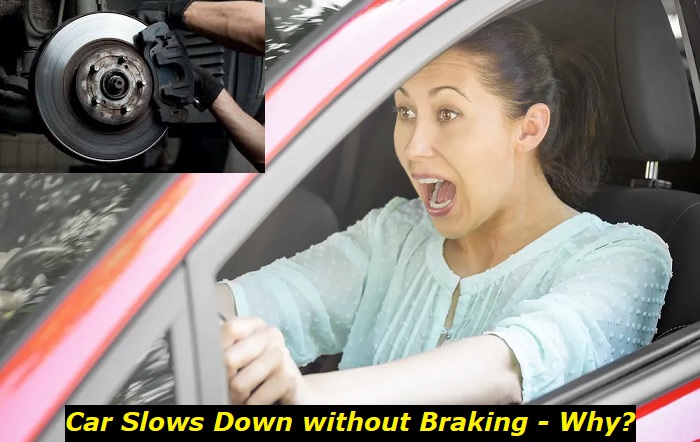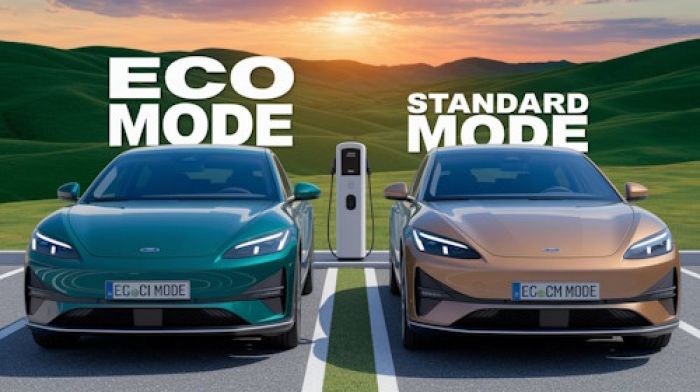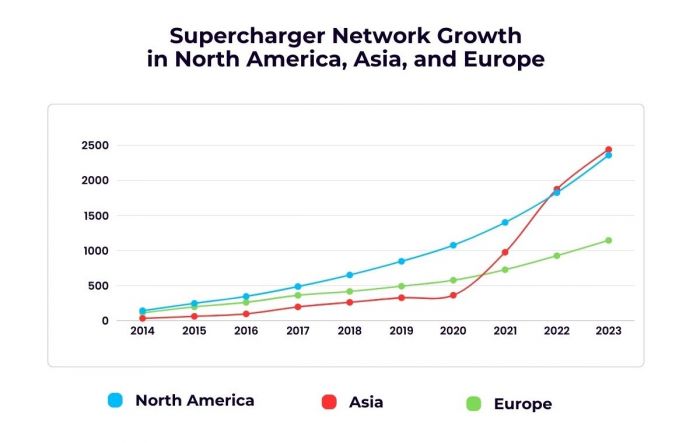Sometimes, the car may display a message to explain the reason or illuminate the icon for the possible reason. But the light often may only indicate where the problem lies, leaving you with many guesses.
Does your car slow down without braking?
Common brake problems highlights
- Level of urgency:super-urgent
- DIY diagnostics:possible but not recommended
- DIY repairs:impossible
- Price for repair:$150 - $450
- Common symptoms:issues with braking, car brakes on its own, brakes are inefficient, sounds when braking
- Commonreasons:fluid issues, caliper problems, cylinders problems, brake booster issues
- If ignored:no brakes, accidents, dangerous situations

Car Slows Down Without Braking - What Can Be the Reason?
Here are common reasons your car slows down without you braking. Check them out to learn more about how they cause this problem.
1) Malfunctioning brakes
If you've just had the brake shoes replaced or some other brake service done, you should check this first. New brake shoes may be too thick and they will just touch the brake rotor causing the car to brake unintentionally even when you don't touch the brake pedal.
But this is the most obvious yet not the only reasons why your vehicle may be braking by itself. We've found some others that are less common but still possible.
2) Clogged Fuel Filters
If your fuel filters are clogged, you may experience your car slowing down without your feet on the brakes.
Fuel filters bar impurities in your gas from reaching your fuel injection system and inside your engine. These impurities include rust, sediments, and debris. It is usually a cartridge with sieve-like materials.
This is one of the most common reasons your car can slow down without your feet on the brakes. Since they catch contaminants in the gas before it reaches the engine, they will usually become clogged.
When the filter is clogged, your engine will not get an adequate supply of gas to produce enough power for more acceleration.
If you have clogged fuel filters, replacing them with new ones is the way to correct the problem with your car.
3) Blocked Fuel injectors
Blocked or leaking fuel injectors can make your car slow down without braking. Fuel injectors are responsible for squirting high-powered fuel streams into the cylinder for mixture with air and combustion.
These small electro-mechanical devices increase your car's power and acceleration by increasing the fuel supply into your car's combustion chambers. The number of fuel injectors in your vehicle will depend on the number of cylinders in the engine.
But when you have clogged or leaking fuel injectors, your car may begin to slow down even though your foot is not on the brake pedal.
The main reason is that your vehicle will not get the boost it needs for continued acceleration since the fuel injectors are not supplying adequate fuel.
When your fuel injectors get clogged, other symptoms you may notice with your vehicle will usually include misfiring, problems with the ignition, and an excessive smell of fuel in your car.
If your fuel injectors are clogged, you can have them professionally cleaned.
4) Electronically Detected Problems in The Car
Depending on the type of car you drive, some vehicles are equipped with computers programmed to detect problems with the car and put the vehicle in limp mode until you clear the problem.
It is more likely to happen with the newer car models. But it will usually follow the illumination of the engine light on your icon panel or the "Check Engine" message.
Newer car models are usually accompanied by a control unit that puts the car into a mode where power is reduced. The goal is to help the car avoid any accidents.
Although this engine control unit is designed as a security feature that comes once the engine or transmission has a fault, it will slow your car down when it detects a problem.
Other symptoms you may notice for this cause include a reduction in air conditioning, low performance, and restricted functions. The best way to deal with this cause is to have a mechanic inspect your vehicle for any possible electronic or mechanical problem.
Usually, until you fix the underlying problem, your vehicle will continue slowing down without braking.
5) Problems With Your Turbocharger
Problems with your turbocharger can cause your car to slow down without braking. Turbochargers are devices that are designed to force more air into the engine. It compresses the intake to force more oxygen into the engine.
The oxygen molecules become closely packed when air is forced into the intake. The mixture of more oxygen and fuel gives the engine the extra boost it needs.
Although turbochargers increase the efficiency of your engine, your car will slow down without braking when your turbocharger becomes faulty.
Many modern cars now come with turbo Chargers. Some reasons your turbocharger can become problematic include debris in the turbo, clogged oil filters, or some other fundamental problem with the turbocharger.
If your car is slowing down without braking because of a problem with your turbocharger, it would be best to hire a mechanic to find the problem and fix it.
6) Clogged Catalytic Converter
A clogged catalytic converter may be why your car slows down when your foot is not on the brake pedal.
The catalytic converter is a device that controls exhaust emissions. It converts harmful gas from the car into less toxic pollutants by catalyzing a redox reaction.
But your car can begin to slow down without braking when there is an obstruction in your catalytic converter.
When your catalytic converter is clogged, the gas from your exhaust pipe will be trapped either partly or wholly. The implication is that your engine will not rev to its full capacity. Hence, your car may slow down without braking, even when you are pumping the gas.
If you notice a clogged catalytic converter, it would be best to hire a mechanic to check what is obstructing the converter and fix the problem.
7) Problems With Your Timing Belt or Chain
Fixing the timing belt or chain wrong can cause your car to slow down without braking. Timing belts and chains harmonize the rotation of the crankshaft and camshaft.
The harmony in their movement ensures that your engine's valves open and close correctly. This is necessary for the proper correlation with the timing of the position of the pistons.
If the tension is inadequate or the belt is not well maintained, your engine's valves will open and close at the wrong intervals in relation to the positioning of the pistons. When this happens, you may begin to notice your engine losing power.
Although problems with timing belts and chains are usually rare, another symptom that often accompanies problems with timing belts is a strange clanking noise from your engine.
If your car is slowing down without brakes and you hear a clanking noise from the engine, you may suspect the timing belt. You want a mechanic to diagnose the problem to see whether it needs to be replaced or properly installed.
8) A Clogged Diesel Particulate Filter
A clogged diesel particulate filter may also be the reason your car slows down without braking. This is especially so for cars that use diesel.
The diesel particulate filter is a device that treats the exhaust from your diesel engines, such as soot and ash. There is a requirement for speed and longer journeys to enable the filter to clean itself.
So the filter will often become clogged from short trips at low speeds.
Also, using the wrong oil, low-quality fuel, and poor maintenance servicing can lead to failed diesel particulate filters.
Cars with diesel particulate filters usually go into limp mode when the vehicle detects a problem with its diesel particulate filter. When this happens, your car will lose power and slow down without braking. This design aims to prevent any further damage to the vehicle or over-fueling.
You will need to have a mechanic look closely at the vehicle to know the exact problem and fix it for you.
9) Other causes
A problem with the fuel system in your car can make your car slow down without braking because it will essentially make your engine lose power.
If your fuel-air mixture has too much gasoline or too little gasoline, your engine may experience a power loss.
Also, ash, debris, or engine oil spills on your spark plugs can cause your engine to misfire, leading to a loss of power for your engine. Plugs with melted electrodes will also misfire, leading to a loss of power for your engine.
These problems can cause more severe problems that can damage your engine. So it would be best to hire a mechanic on time to diagnose the problem and suggest a way to fix it.
Bottom Line
Whether you drive a gasoline or diesel-powered car, the proper and only reason your car should stop is when you apply the brakes. When your car stops or slows down without you applying the brakes, there is a reason to be worried.
You will usually notice the car steadily slow down. You may pump the gas to increase the power, but the car will usually not respond. It is common to find that the car will sound normal and not make strange noises when it slows down.
Many drivers also report that there are no vibrations with the steering. While this may be normal, it will not be the same case for everyone. So it would be best to get help at the nearest mechanic shop to avoid severe damage.
About the authors
The CarAraC research team is composed of seasoned auto mechanics and automotive industry professionals, including individuals with advanced degrees and certifications in their field. Our team members boast prestigious credentials, reflecting their extensive knowledge and skills. These qualifications include: IMI: Institute of the Motor Industry, ASE-Certified Master Automobile Technicians; Coventry University, Graduate of MA in Automotive Journalism; Politecnico di Torino, Italy, MS Automotive Engineering; Ss. Cyril and Methodius University in Skopje, Mechanical University in Skopje; TOC Automotive College; DHA Suffa University, Department of Mechanical Engineering






Add comment